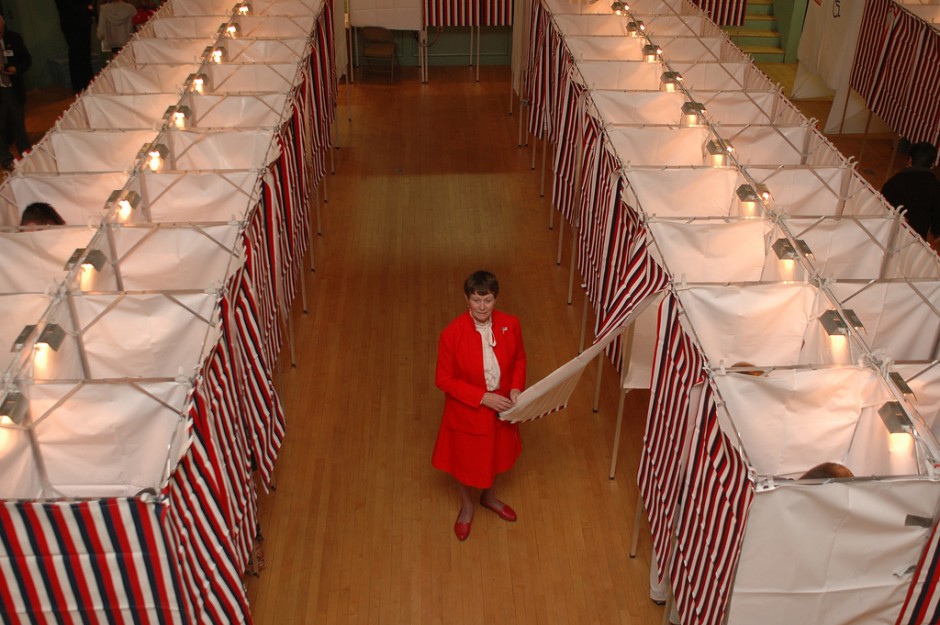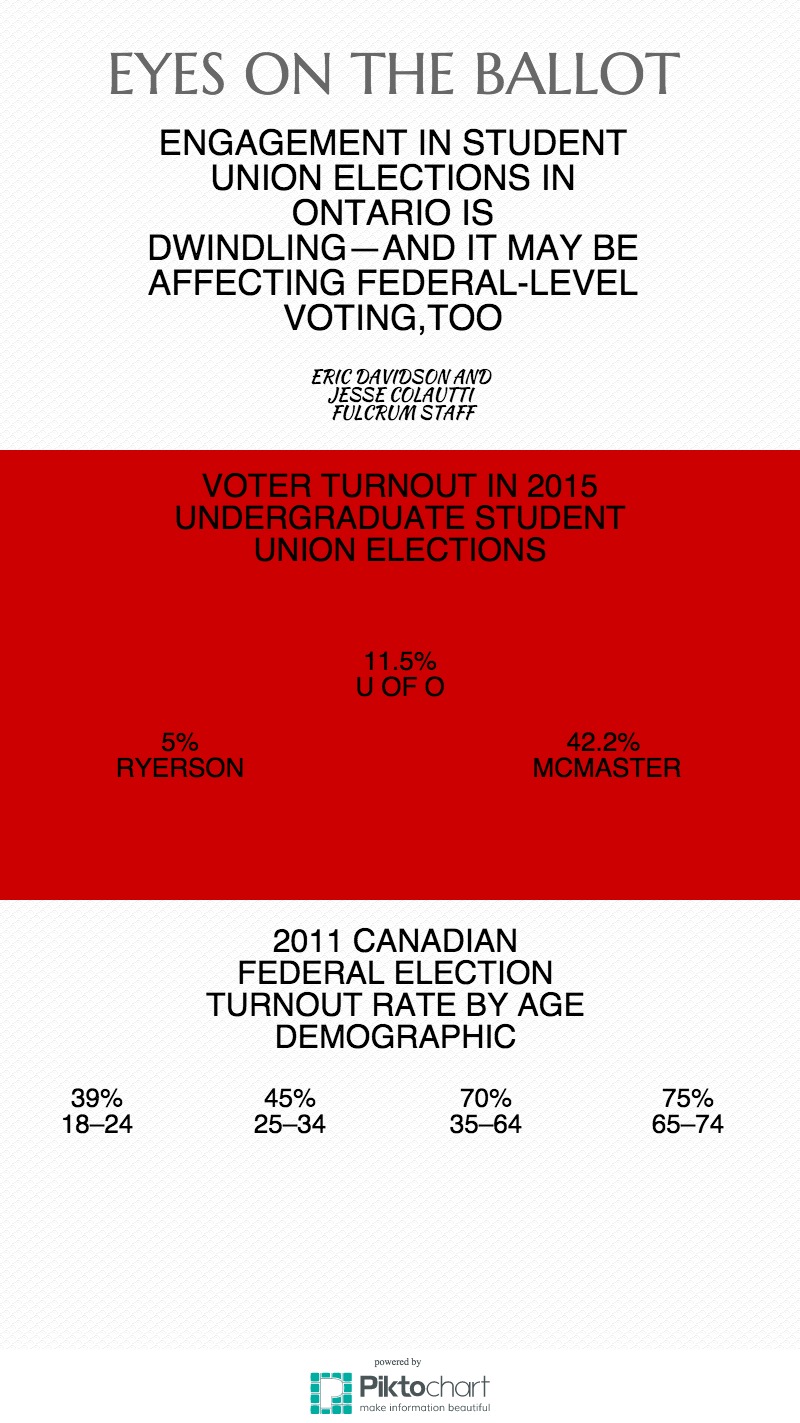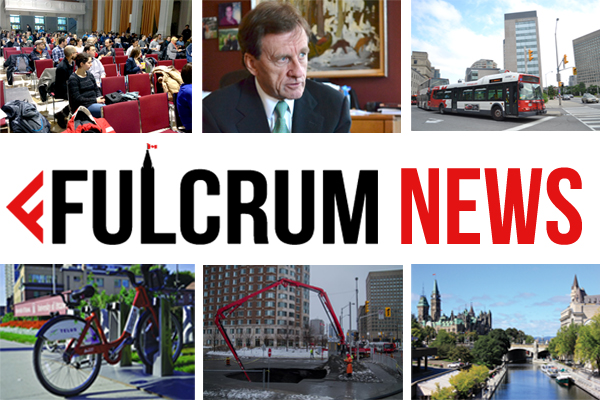Engagement in student union elections in Ontario is dwindling—and it may be affecting federal-level voting
Illustration by Marta Kierkus and Photo by Remi Yuan and Creative Commons
“If they ran on the platform of making tuition free, that’s probably what it would take for me to go out and vote,” says a third-year chemistry student. “I just don’t feel like any of the candidates will represent me,” says a second-year history major. “It won’t make a difference,” says a third-year engineering student.
Lately, students at the University of Ottawa have been finding all sorts of reasons not to vote.
In the Student Federation of the University of Ottawa (SFUO) elections held in February, 11.5 per cent of students turned out to vote, a number virtually on par with the 2014 results, and a slight improvement from 10 per cent in 2013.
In the Graduate Students Association (GSAÉD) elections held in March, only one hundred students voted, out of a total 6,300 eligible voters.
And when the SFUO attempted to hold a general assembly in November 2014, it failed to even meet the quorum of 337 students. The second general assembly on Mar. 24 garnered even less interest.
The lack of engagement during student union elections goes far beyond the U of O. Universities across Ontario are experiencing low voter turnout in student elections to varying degrees.
In the past year, voter rates at Ontario universities ranged from 5 per cent of the 31,000 undergraduate students at Ryerson to 42.2 per cent of the 21,000 undergraduates at McMaster.
Apathy tends to take most of the blame.
“It could be apathy to the political process itself,” said Matt McLean, chair of the Wilfrid Laurier University Students’ Union board of directors, in a Feb. 11 interview with the Cord, the Waterloo school’s student newspaper. “Apathy usually comes from misinformation and disengagement, so we find those that are apathetic are the ones that are not trying to find the information.”
Others believe in a more sinister problem that lies in conscious efforts to disengage potential voters.
“This year we have seen a concerted online effort by a select few to disengage students that has only been based upon misinformation,” said Emily Niles, a current student at the U of O and former general campaigns organizer of the SFUO. “This tactic is short-sighted and irresponsible. The only thing this does is divide students on campus. When other students see this it is confusing and disenfranchising, especially around election time.”
And while the stakes of low voter turnout during student elections for the majority of Canadians are low, the more troubling thought is that this trend of apathy has surfaced among youth voters in federal elections, too—a reality that may lead politicians to avoid the issues that young Canadians care about the most.
Understanding the youth vote
According to Statistics Canada, the 2011 federal election turnout rate was 50 per cent among young adults aged 18–24, and closer to 60 per cent among young adults aged 25–34. These are the lowest rates of all demographics, and are especially low compared to adults aged 65–74, whose voter turnout rate was 82 per cent.
This discrepancy in voting patterns means that politicians can afford to ignore the concerns of younger generations while they focus on generating votes from older Canadians.
“If any group in society does not vote, then politicians will not address that group’s concerns,” said Duff Conacher, co-founder of Democracy Watch and visiting professor at the University of Ottawa.
Low voter turnout numbers among young adults, especially relative to older voters, is a problem not only for students, but for Canada’s future in general. According to Green Party leader and MP Elizabeth May, young voters have more of an incentive to think about longer-term issues.
“I think all of us care about the future. But some of us have more future than others,” said May.
“Issues like student debt, youth unemployment, and the climate are huge issues. The younger you are, the more it matters,” she said. “The group I believe that can turn things around in Canada and rescue the whole country is young people.”
While many acknowledge the importance of getting youth out to vote, there’s less consensus on why about half of all Canadians aged 18–24 don’t vote in federal elections. It’s easy to blame apathy, but Conacher says the truth is more complex. He said many young people are disenchanted with the political system in general.
“Youth who are 18–35 years old, they’ve grown up with lots of people saying that politicians act unethically,” he said. “And why would you vote for anyone who’s going to act that way?”
May said another section of this group of non-voters are what she calls “anti-voters.”
“They’re people who are politically aware and analytical of the dysfunction in our current system,” she said. “They’ve decided not to vote as a form of protest.”
Romi Chan, a first-year law student at the U of O, says she chose not to vote in the most recent SFUO election for that very reason.
“I didn’t vote because I don’t like the system, procedure, or how candidates just keep making lateral moves,” she said. And while Chan said she has always been an active voter in both federal and provincial elections, she may decide not to vote in the upcoming federal elections later this year.
“I think democracy and public participation are truly important. We are lucky (in Canada). But I also think our system is broken.”
Other non-voters do so for less passionate reasons. “There are those who would vote if they knew more about it, and feel disempowered and disenfranchised,” May said. “They fear their vote won’t count.”
Niles, who helped out with the Canadian Federation of Students’ (CFS) Take It Over campaign during the 2011 federal election and the Generation Vote campaign during the 2014 Ontario provincial election, says she sees similarities between federal elections and student union elections in that politicians and interest groups “also use tactics to deliberately disengage youth.”
“However, unlike in students’ union elections where student issues are front and centre, in the provincial and federal elections they often ignore student issues as we are not seen as a demographic that will win them elections,” she said.
Changing the techniques of voting
In addition to politically motivated reasons, some technical aspects of voting may be hampering potential youth voters.
Identification requirements for federal elections increased with the Fair Elections Act passed last spring.
Voters used to be able to just show up with no ID, and another voter from that riding could vouch for their identity.
But due to the Fair Elections Act, this is no longer allowed.
Conacher says this shouldn’t have that large of an impact on voter turnout, however, since more than 40 different pieces of identification are still accepted, including library cards. He says there will also be more advance polling days for the upcoming federal election, and more groups trying to educate voters on proper voting technique.
One potential solution to low voter turnout that has cropped up in a few Canadian universities is online voting. Universities that have experimented with online voting for student union elections include McMaster, Queen’s, Wilfrid Laurier, and the U of O.
“Just the convenience of it is a huge aspect. And it reaches all students equally, not just those on campus,” said Chris Casher, chief electoral officer of the Queen’s Alma Mater Society, in an interview with the Canadian University Press.
But online voting has had mixed success. It increased turnout at McMaster, kept turnout steady at Queen’s, lowered turnout at Wilfred Laurier, and was abolished at the U of O due to security concerns.
Those security concerns are one reason why Niles said the Canadian government should not try to engage young voters with online voting. “We’ve seen countless examples of how online voting systems are not secure at various electoral levels. The risk of manipulated, and thus illegitimate, election results by online hacking far outweighs the convenience.”
There has been talk of instituting online voting at the federal level in Canada. In August 2011, Marc Mayrand, chief electoral officer of Elections Canada, told a parliamentary committee that “Elections Canada has been examining Internet voting as a complementary and convenient way to cast a ballot.” Mayrand also told the CBC that online voting is “the way of the future.” But plans for such a system were scrapped in April 2013 due to budget cuts at Elections Canada.
The buddy system
May says that while online voting may entice apathetic voters, more improvement can come through personal connections as opposed to technical changes.
“I believe that convincing someone to vote is best done one-on-one. It’s a personal thing,” she said. “Whenever I’m speaking to groups, I urge people to take on a personal commitment to get somebody else to vote. It’s a buddy system. Not telling them how to vote, just saying I want to bring you with me to an advance poll. If a lot of people did this, we’d significantly up voter turnout.”
And it seems that May is not the only one in favour of the buddy system. Conacher is involved with an initiative called Vote Promise that puts May’s preaching into practice. “We’re asking voters to promise not only to vote, but to recruit three to 10 non-voters and help them vote,” he explained.
“If you reach out to voters and say vote … it won’t increase voter turnout, they already vote. And we’re not going to reach non-voters, they’re not engaged.”
Vote Promise is still in its early stages but it could have a serious impact. Its success hinges on two main factors: popularity among individual Canadians, and popularity among citizen groups, such as the CFS. Conacher says around 5 million people in Canada belong to a citizen’s group, so encouraging voting within such groups could make a dramatic difference come election time.
Conacher has spent endless hours thinking of what to say to best convince people to vote, but in the end he says it comes to knowing your vote matters.
“You should show up because if you don’t, politicians will never address your concerns,” he said. “They’ll think you don’t really care.” And although it may be a tired old cliché, every vote counts. “There are many ridings that are determined by a few hundred votes,” he said.
“There are surprises every single election.”
It’s easy to find fault with politicians, whether they are students or MPs, and all too easy to become disillusioned with aspects of the political system.
But inaction and apathy are in many cases voiceless protests. And whether it affects a six-person student union executive or the entirety of Canadian Parliament, change begins at the ballot box.










